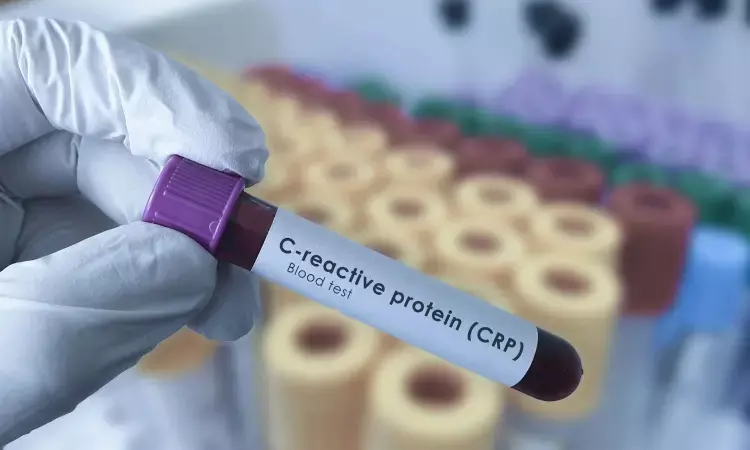- Home
- Medical news & Guidelines
- Anesthesiology
- Cardiology and CTVS
- Critical Care
- Dentistry
- Dermatology
- Diabetes and Endocrinology
- ENT
- Gastroenterology
- Medicine
- Nephrology
- Neurology
- Obstretics-Gynaecology
- Oncology
- Ophthalmology
- Orthopaedics
- Pediatrics-Neonatology
- Psychiatry
- Pulmonology
- Radiology
- Surgery
- Urology
- Laboratory Medicine
- Diet
- Nursing
- Paramedical
- Physiotherapy
- Health news
- Fact Check
- Bone Health Fact Check
- Brain Health Fact Check
- Cancer Related Fact Check
- Child Care Fact Check
- Dental and oral health fact check
- Diabetes and metabolic health fact check
- Diet and Nutrition Fact Check
- Eye and ENT Care Fact Check
- Fitness fact check
- Gut health fact check
- Heart health fact check
- Kidney health fact check
- Medical education fact check
- Men's health fact check
- Respiratory fact check
- Skin and hair care fact check
- Vaccine and Immunization fact check
- Women's health fact check
- AYUSH
- State News
- Andaman and Nicobar Islands
- Andhra Pradesh
- Arunachal Pradesh
- Assam
- Bihar
- Chandigarh
- Chattisgarh
- Dadra and Nagar Haveli
- Daman and Diu
- Delhi
- Goa
- Gujarat
- Haryana
- Himachal Pradesh
- Jammu & Kashmir
- Jharkhand
- Karnataka
- Kerala
- Ladakh
- Lakshadweep
- Madhya Pradesh
- Maharashtra
- Manipur
- Meghalaya
- Mizoram
- Nagaland
- Odisha
- Puducherry
- Punjab
- Rajasthan
- Sikkim
- Tamil Nadu
- Telangana
- Tripura
- Uttar Pradesh
- Uttrakhand
- West Bengal
- Medical Education
- Industry
hsCRP useful biomarker for early diagnosis of prediabetes: Study

Wardha, IND: A recent study has reported high sensitivity C-reactive protein (hsCRP) to be a definite predictor of inflammation in prediabetes. Also, hsCRP was found to be directly proportional to low-density lipoprotein and cholesterol -- risk factors of prediabetes.
Based on the findings, published in the journal Cureus, the authors concluded that hsCRP can be used as an early predictor of inflammation in prediabetes. It can also be a marker of underlying deranged sugar levels and lipid profile in pre-diabetics unaware of their health status.
Prediabetes is a state of intermediate hyperglycemia and is known to be associated with low-grade inflammation, although it looks benign. hs-CRP is a sensitive marker to detect low-grade inflammation. Sunil Kumar, Datta Meghe Institute of Medical Sciences (Deemed to be University), Wardha, IND, and colleagues aimed to study whether hsCRP can be used as a biomarker in the early diagnosis of pre-diabetes in a rural population.
The study enrolled a total of 200 participants, including 100 cases and 100 controls who were age- and gender-matched. Enrollment was done according to the World Health Organisation criteria for pre-diabetes. All the cases and controls underwent a detailed history, physical examination, anthropometric measurements, and biochemical analysis. The biochemical analysis included blood glucose levels, lipid profile, and hsCRP.
The authors found that the mean hsCRP in pre-diabetics 2.17 ± 0.72 mg/L was significantly higher than controls (0.66 ± 0.22 mg/L). High sensitivity CRP was significantly and positively correlated to age, body mass index (BMI), total cholesterol, low-density lipoprotein, cholesterol, and waist-hip ratio.
The researchers concluded, "Raised level of hsCRP was associated with pre-diabetes and also correlated with age, higher BMI, higher cholesterol, higher low-density lipoprotein, and higher waist-hip ratio."
Reference:
Ghule A, Kamble T K, Talwar D, et al. (October 28, 2021) Association of Serum High Sensitivity C-Reactive Protein With Pre-diabetes in Rural Population: A Two-Year Cross-Sectional Study. Cureus 13(10): e19088. doi:10.7759/cureus.19088
Dr Kamal Kant Kohli-MBBS, DTCD- a chest specialist with more than 30 years of practice and a flair for writing clinical articles, Dr Kamal Kant Kohli joined Medical Dialogues as a Chief Editor of Medical News. Besides writing articles, as an editor, he proofreads and verifies all the medical content published on Medical Dialogues including those coming from journals, studies,medical conferences,guidelines etc. Email: drkohli@medicaldialogues.in. Contact no. 011-43720751


